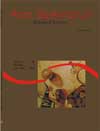<b>Effects of salinity and organic wastes on zooplancton community, with emphasis on copepodes, in the <em>Itanhaém</em> river estuary, <em>São Paulo</em> state</b> - DOI: 10.4025/actascibiolsci.v26i1.1652
Abstract
The objective of this work is to analyze the effects of salinity and wastewater on the zooplankton community of the Itanhaém river estuary, São Paulo state. Samples of zooplankton as well as physical and chemical variables of water were collected in four sites, located between the coastal line and the superior part of the estuary, including a secondary channel where wastewater is thrown without previous treatment. The samples were collected in low and high tide in winter and summer. Results showed that the estuary presents a temporal and spatial variation of physical and chemical characteristics, especially salinity, in function of the tide and seasonal variation of rain. The high values of salinity occurred in winter and high tide. Zooplankton community was adapted to the dynamic of salinity, and marine and estuarine species occurred in the low part of the estuary in winter. Although the Itanhaém river estuary has the same temporal and spatial dynamic of other estuaries, the values of salinity are low when compared with others located in the southern coast of São Paulo. Consequently, mainly oligohaline and fresh water species constitute the zooplankton community. These characteristics are due to the great drainage area of the Itanhaém river basin. The waste water modified physical and chemical characteristics of water that now presents higher concentrations of nutrients, higher values of suspended matter and lower concentrations of oxygen. It was observed a positive relation between the density of nauplii of copepods and organic pollution in this estuaryDownloads
Download data is not yet available.
Published
2008-04-01
How to Cite
Pereira, P. E. S., & Camargo, A. F. M. (2008). <b>Effects of salinity and organic wastes on zooplancton community, with emphasis on copepodes, in the <em>Itanhaém</em> river estuary, <em>São Paulo</em> state</b> - DOI: 10.4025/actascibiolsci.v26i1.1652. Acta Scientiarum. Biological Sciences, 26(1), 9-17. https://doi.org/10.4025/actascibiolsci.v26i1.1652
Issue
Section
Biology Sciences
DECLARATION OF ORIGINALITY AND COPYRIGHTS
I Declare that current article is original and has not been submitted for publication, in part or in whole, to any other national or international journal.
The copyrights belong exclusively to the authors. Published content is licensed under Creative Commons Attribution 4.0 (CC BY 4.0) guidelines, which allows sharing (copy and distribution of the material in any medium or format) and adaptation (remix, transform, and build upon the material) for any purpose, even commercially, under the terms of attribution.
Read this link for further information on how to use CC BY 4.0 properly.
0.6
2019CiteScore
31st percentile
Powered by 

0.6
2019CiteScore
31st percentile
Powered by 












1.png)




3.png)













